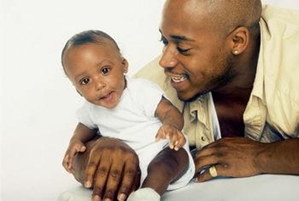Sure, you’re the one with the growing baby bump, but there are changes afoot for dad-to-be too. He may not be battling pregnancy acne or suffering swollen ankles, but your partner has his own set of prenatal shifts happening inside his body. Just as these fluctuations affect women and cause symptoms such as morning sickness, mood swings, hair growth and more, discovering they’ll soon be bringing home a baby, causes real, physical changes in dads too.
The details
An extensive study published in the American Journal of Human Biology put first-time expectant parents in the hot seat. Testing their saliva for hormone levels at several intervals throughout pregnancy, researchers found nothing surprising where women were concerned. Throughout gestation, female participants experienced elevated levels of male hormones testosterone and progesterone and the stress hormone cortisol. In other words, that’s all old news.
However, when the scientists began analyzing the samples collected from dads-to-be, they discovered some pretty interesting takeaways: Early on in pregnancy – soon after learning that they are going to be a dad – the men in the study showed a significant drop in testosterone and increased levels of cortisol. The researchers clarified that the hormone drop was worth discussing, yes, but it was not anything they’d classify as a case of “low testosterone.”
“Other studies have shown that men’s hormones change once they become fathers, but our findings suggest that these changes may begin even earlier, during the transition to fatherhood,” said Dr. Robin Edelstein, lead author of the study, told Medical News Today.
What they mean
The researchers weren’t sure why men experienced these hormonal changes alongside their pregnant wives, but Edelstein did offer a few guesses.
“These changes could be a function of psychological changes that men experience as they prepare to become fathers, changes in their romantic relationships, or even physical changes that men experience along with their pregnant partners,” Edelstein said.
A decrease in testosterone, for example, could help ensure an expectant dad is more nurturing to both mom and baby. An increase in cortisol, on the other hand, could give him the boost he needs to help get his life, home and finances fit for baby.
The bottom line
At the end of the day, this study serves as a gentle reminder to all expectant moms: As women, we certainly bear the brunt of pregnancy, labor and delivery – but our partners are in this too. Bringing a new life into the world is as scary, amazing and joyful as it gets. Let’s not deny the changes our partners are experiencing right alongside us.
